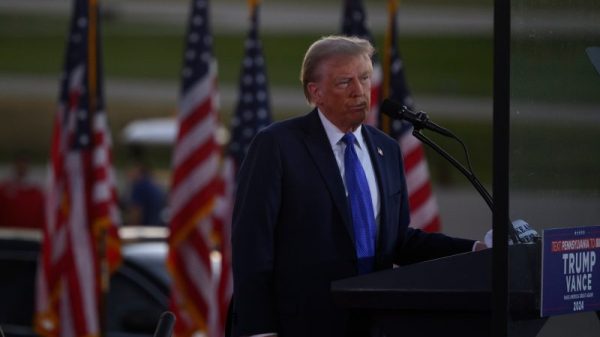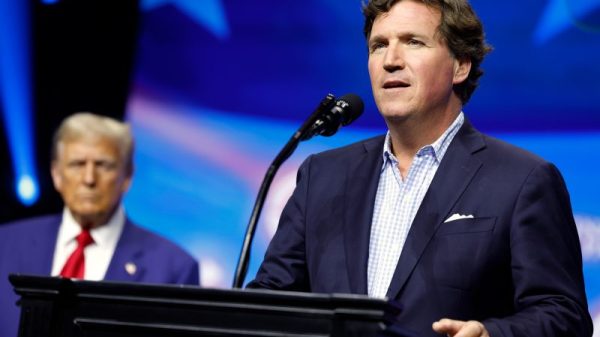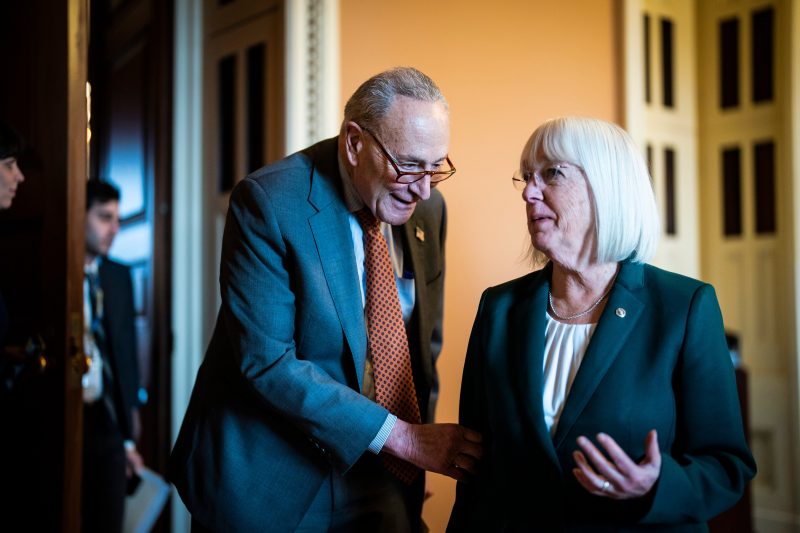Congress on Thursday passed legislation to keep the federal government open into March, approving the third stopgap spending bill in four months as lawmakers struggle to agree on long-term government funding plans.
The bill extends deadlines to March 1 and March 8. Money for roughly 20 percent of the government — including the Transportation Department, some veterans’ assistance, and food and drug safety programs — had been set to expire just after midnight early Saturday. The remainder — which funds the Defense and State departments, among other critical functions — would have expired Feb. 2 without the new extension.
The Senate passed the legislation, 77-18, Thursday afternoon. The House followed suit, 314-108, hours later, after GOP hard-liners launched a last-minute pressure campaign to attach partisan border security measures to the funding package. The votes send the legislation to President Biden to sign into law and avert a partial shutdown ahead of the deadline.
The stopgap spending bill, called a continuing resolution, or CR, is intended to give lawmakers in both chambers time to draft and vote on a full slate of annual spending, or appropriations bills, for the rest of the 2024 fiscal year, which ends on Sept. 30.
“We have good news for America: There will not be a shutdown on Friday because both sides have worked together,” Senate Majority Leader Charles E. Schumer (D-N.Y.) said on the Senate floor Thursday.
Schumer and House Speaker Mike Johnson (R-La.) agreed to a $1.66 trillion appropriations deal earlier in January, covering all of what’s known in federal budgeting as discretionary spending. But lawmakers didn’t have time to negotiate and enact the finer details of the package before this weekend’s deadline.
That deal, which largely follows an agreement Biden struck with Johnson’s predecessor, Kevin McCarthy (R-Calif.), in 2023, would increase total spending this year by $28 billion over the previous fiscal year’s $1.63 trillion in discretionary spending — an amount that, accounting for inflation, represents a cut in real dollars.
Lawmakers will have to move faster than appears to pass the 12 appropriations bills. The House and Senate are only in session together six days between Friday and March 1, the first deadline of Thursday’s bill, and 10 days between Friday and March 8, the second deadline.
The deal could exacerbate tensions between the speaker and the House Freedom Caucus, a group of archconservatives who have been a thorn in the side of GOP leadership for nearly a decade.
Hours before the Senate approved the funding extension, the Freedom Caucus made a final appeal to Johnson to consider attaching border security policies amid a faceoff on the issue between the White House and Congress.
The group’s chair, Rep. Bob Good (R-Va.), and other members pitched Johnson a plan to attach House Republicans’ partisan bill without some controversial policies that would require employers to verify a potential employee’s immigration status. In exchange, they would support a rule vote — a procedural hurdle they have voted against in the past to stall floor business — that would allow the funding bill with the border security legislation to move forward for a vote.
But Johnson rejected that deal, Good told The Washington Post and the speaker’s office confirmed, and the Freedom Caucus chair said the group would retaliate by throwing sand in the gears of Johnson’s plans for floor action.
The speaker has been leaning on Democrats to support bills through a process called “suspension of the rules,” which avoids certain procedural steps but allows bills to pass with a two-thirds majority of the House. The chamber used the same tactic for the temporary spending bill Thursday.
“If you don’t need our votes for the material bills that matter for the country — such as funding the government and our major spending packages — and you continue to pass those under suspension of the rules with predominantly Democratic votes, then don’t presume you’re going to have our votes for the messaging bills that don’t matter, that make us feel better, but are dead on arrival in the Senate,” Good said.
Johnson did not commit to changing plans. Doing so would have irritated the rest of the GOP conference, many of whom have pushed Johnson to ignore the hard-right flank’s demands, which often cannot be met. It also would have delayed consideration of the Senate’s continuing resolution. The House Rules Committee would have had to meet, and the House would have had to conduct several hours of debate before they could vote on the Freedom Caucus’s preferred measure. House leadership already canceled votes for Friday to allow members to head home to their districts ahead of snow expected in the morning in Washington.
That strain between the speaker and the hard-right faction has begun testing the patience of other Republican lawmakers and especially among appropriators, who must negotiate and draft the annual spending bills.
“In order to move the conservative agenda forward, we need to have Republicans vote for the rules so that we can move those issues forward. And we’re having a problem with that. It’s not a surprise. We knew that this was going to happen,” Rep. Mario Diaz-Balart (R-Fla.), an Appropriations Committee leader, told The Post earlier in the week. “Folks who are obstacles to bringing Republican bills to the floor? They might they call themselves what they want. They’re not conservatives.”
Democrats throughout Congress have applauded Johnson’s stand against the Freedom Caucus. Schumer has repeatedly hailed the speaker’s resolve against “the hard-right’s bullying,” which he called “MAGA extremism in a nutshell” on the Senate floor Thursday.
“It is an absolutely phony process that these Freedom Caucus guys are pursuing,” Rep. Steny H. Hoyer (Md.), a long-standing Democratic member who sits on the Appropriations Committee, told The Post on Thursday. “We ought to just make them irrelevant. And the way we make them irrelevant is to make a deal with one another because [Republicans and Democrats] together, we’ve got over 300 votes.”
Freedom Caucus members were furious as the day unfolded.
“It is Groundhog Day in the House chamber, all the time, every day, spending money we don’t have,” Rep. Chip Roy (R-Tex.), a stalwart of the group, said on the House floor.
The Freedom Caucus earlier this month demanded that Johnson abandon his larger funding deal with Schumer in favor of insisting on spending cuts that restore the federal budget to pre-covid levels. Some also called on the speaker to link government funding to new immigration restrictions along the U.S.-Mexico border.
But Johnson rebuffed those calls. His deal with Schumer adheres to the wider agreement that McCarthy made with Biden in the spring as part of negotiations to suspend the nation’s debt limit. (McCarthy resigned from Congress at the end of 2023.)
Johnson’s deal claws back $10 billion in Internal Revenue Service funding in 2024 and $6.1 billion in unspent coronavirus emergency aid.
“We forged forward. We got the top-line agreement. And in spite of what people are saying on both sides, this is a better agreement than we had,” the speaker told reporters Wednesday. “We went in and carved it up. We got $16 billion in real cuts out of the IRS slush fund and covid slush fund that the Biden administration was so jealously guarding and protecting, and that’s an important improvement.”
He said that House appropriators would look to add policy provisions to the final spending bills, which could complicate their final passage before the March deadlines.
House Republicans have previously sought to attach riders that restrict access to abortion medication and increase U.S.-Mexico border security. Those provisions face long odds even in the House, where Johnson has signaled he will lean on Democrats to help pass spending bills. And they would be non-starters in the Democratic-controlled Senate.
“We’ll wait and see — and I agree with a lot of what the House is trying to do,” Sen. Deb Fischer (R-Neb.), told The Post on Thursday. “But in the Senate, you have to compromise. The House has to recognize that.”





























